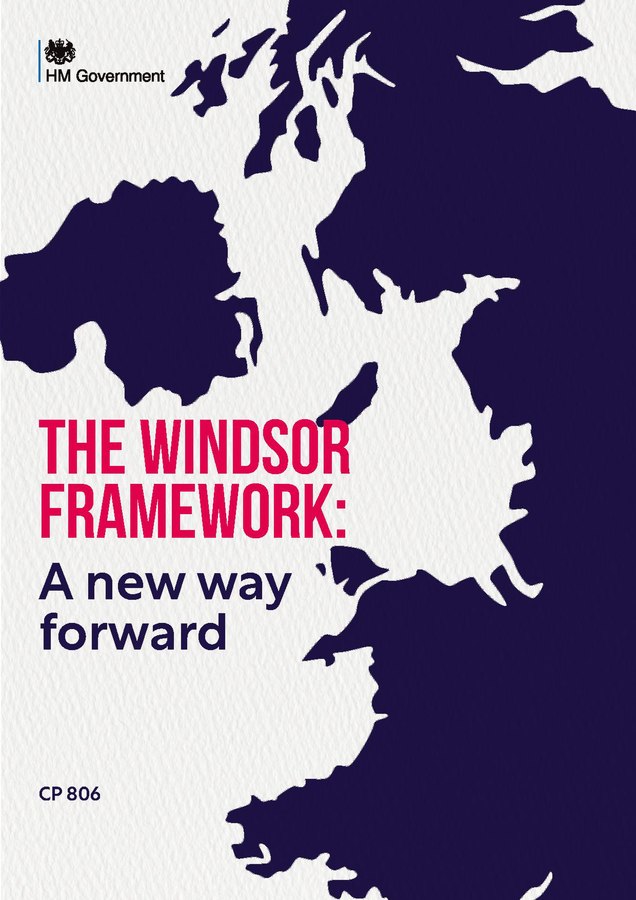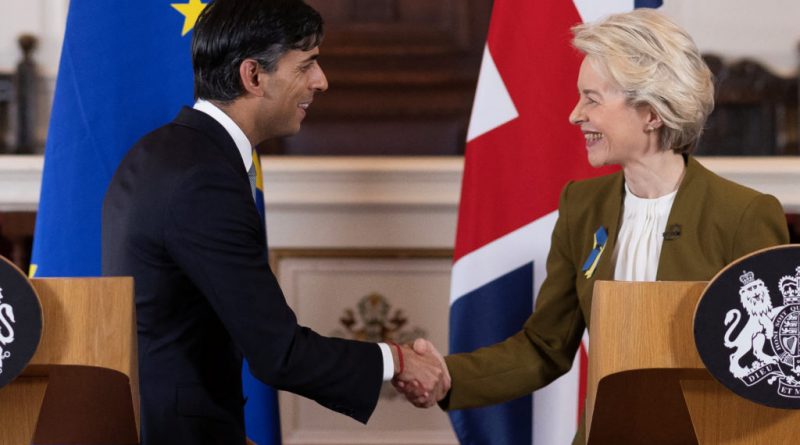UK, EU Announce “Windsor Framework” Agreement
Liam Brucker-Casey
Co-Editor-In-Chief
On Monday February 27th, UK Prime Minister Rishi Sunak, in a joint press conference with European Commission President Ursula von der Leyen, announced the “Windsor Framework.” The agreement concerns the passage between mainland Britain and Northern Ireland, which comprise the United Kingdom.
The need for an agreement is a result of a compromise made in the wake of Brexit, when the UK left the European Union in 2020. To make Brexit a reality Northern Ireland was to be kept behind an Irish Sea “border” and thus still in compliance with the European Single Market. This was done to avoid a “hard” border between Northern Ireland and the Republic of Ireland, a frightful prospect for a region not even three decades removed from The Troubles which saw the border between the two countries become a flashpoint of sectarian violence.

This “Irish Sea Border” left many Brexiteers dissatisfied as trade between Northern Ireland and the rest of the country was subject to various additional rules. For example, a person going from mainland Britain to Northern Ireland in possession of more than €10,000 would have to go through the same procedures as a person traveling from Britain to any part of the EU. It is understandable then why Brexiteers, a group which claims to champion UK sovereignty, would grumble at the Northern Ireland Protocol.
The deal would eliminate the paperwork and bureaucracy for most goods taken from Britain to Northern Ireland, with only goods that are destined for the Republic of Ireland being subject to existing checks and restrictions.

The “Windsor Framework” is far from codified legislation, and is in reality a proposal, for which Sunak intends to garner support from his Conservative Party members. Clearly designed in a bid to entice more hard-Eurosceptic Tories, Sunak touted what he called the “Stormont Brake” which would allow Stormont, the Northern Irish regional assembly, to halt, “changes to EU goods rules that would have significant and lasting effects on everyday lives,” which would stop relevant undesirable rules coming out of Westminster.
While selling the deal to their respective constituencies, it became clear that Sunak and von der Leyen are still leading two somewhat inharmonious efforts. While Sunak sold the “Stormont Brake” as a great victory for Northern Irish home rule, von der Leyen expressed a hope that the Brake would be avoided by both sides conducting extensive mutual consultation before introducing any new legislation and regulation.

If the Windsor Framework is ever to become a reality, Sunak must not only convince his most cantankerous Conservative MPs, but allay the concerns of the DUP. The Democratic Unionist Party, or DUP, is the tentative Northern Irish ally of the Tories, as the Conservative Party does not run their own candidates in Northern Ireland, and relies on the DUP for support in Westminster. In February 2022 the Northern Irish government fell apart as the DUP, which was ruling through power sharing with the Irish Nationalist Sinn Féin, withdrew from the government in protest of the Northern Ireland Protocol, forcing the government collapse. Since then, the DUP has refused to allow the formation of a new Northern Irish ruling government.
Sunak will likely face at least some difficulty in convincing the more hardline Brexiteers in the Conservative Party to support the new framework, but he will undoubtedly encounter considerable skepticism from the DUP, and without the Party’s support the Framework may never be implemented.
Sunak took charge of the Conservative Party and the British Government in October 2022, after the resignation of Liz Truss whose short stint in 10 Downing Street saw a disastrous public reception of her economic proposal which led to her resignation and a steep decline in public approval of the Conservative Party. Should the Windsor Framework succeed, Sunak may lead the Tories to reestablish a comfortable level of support among UK voters. Should he fail, it may spell the downfall of not only Sunak’s time as Prime Minister, but the unbroken Conservative Parliamentary majority which has existed since 2010.
Contact Liam at liam.bruckercasey@student.shu.edu

